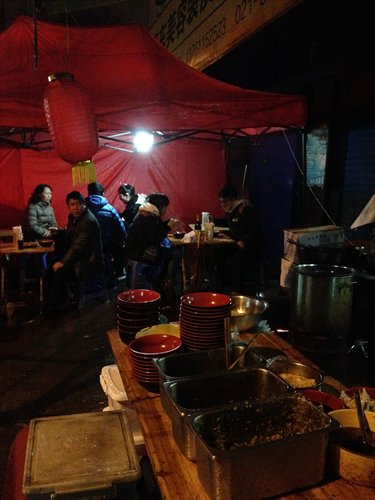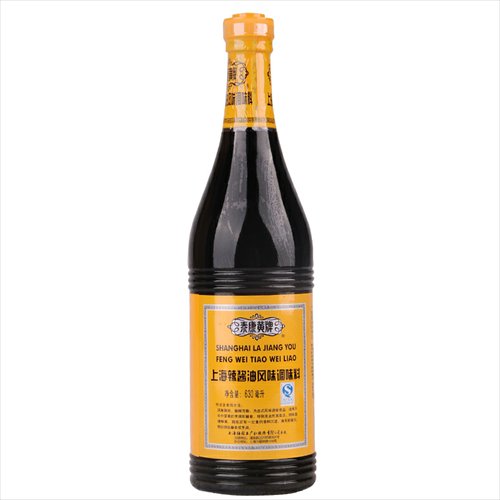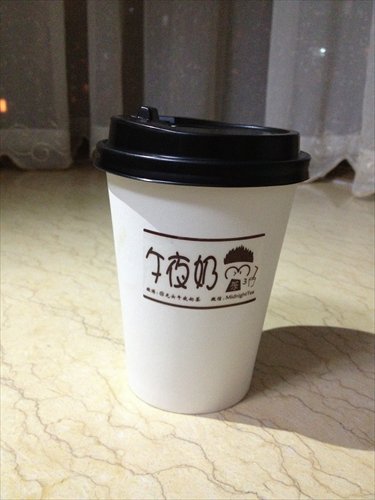Moonlight munchies

People eating at Tongchuan Road market
When the decade-old Pengpu night market in Zhabei district was shut down in December in an attempt to solve the neighborhood's chronic congestion problem, street venders from the market moved their stalls to nearby Baoshan district. Unfortunately, law enforcement officials from Baoshan launched a series of overnight clampdowns in January to drive the vendors out of their jurisdiction.
However, midnight snackers and market prowlers need not go without since a number of street markets with licensed operators still exist around town. Here are three popular night markets that open from around 5 or 6 pm until 2 to 3 am to satisfy your late-night cravings for cheap roadside eats.

A mobile drink shop that operates from a car trunk
Tongchuan Road
Famous for its massive seafood market, Tongchuan Road runs through some of the most densely populated neighborhoods in Putuo district. The local government has announced plans for a relocation project this year and will gradually move the seafood market to the outskirts of the district.
But you'd be wrong to think the move will take away the reason to visit the far-flung neighborhood, for a little-known night market off the western end of the street will remain undisturbed.
Located on the laid-back Wanzhen Road is a strip of fewer than 20 stalls that attracts in-the-know foodies from all across town.
Tan Ayi Zha Zhupai at 1270 Wanzhen Road is one of the most popular spots in the market, with people queuing up for hours to try Auntie Tan's signature deep fried pork chops.

Tan Ayi Zha Zhupai offers deep-fried pork chops and Taikang Huangpai lajiangyou. Photos: nipic.com and Zhu Jialei/GT
No matter whether it's the sweltering summer or the freezing winter, you will see a man preparing the pork chops in front of the stall. He first pounds the pork with a small hammer in order to tenderize the meat and make sure it cooks evenly and quickly. Next the pork is coated in flour and breadcrumbs, and then fried in hot oil for three to five minutes. Auntie Tan is clearly not worried that this open demonstration of the entire preparation process will reveal the secret of her success to competitors because it's the authentic Taikang Huangpai (Yellow Label) lajiangyou she prepares that keeps the customers coming.

Tan Ayi Zha Zhupai offers deep-fried pork chops and Taikang Huangpai lajiangyou. Photos: nipic.com and Zhu Jialei/GT
Lajiangyou is a sauce that tastes sweet, sour and mildly hot, and is made with some 30 spices and vegetables. The predecessor of Shanghai's lajiangyou is the classic British condiment Lea & Perrins Worcestershire Sauce, which first went on sale in the city in 1838. After the founding of the People's Republic of China in 1949, locally produced lajiangyou branded as Taikang Huangpai dominated the market, and since then has been regarded by Shanghainese as the ideal accompaniment to deep-fried pork chops and spring rolls.
A portion of fried pork chops costs 7 yuan ($0.17) and Auntie Tan also sells spring rolls and fried huntun.
Sharing a roof with Auntie Tan is Sange Huoguo Shaokao (Sange Hotpot and Barbecue), whose owner used to be a street vendor. The stall serves grilled scallops, mussels and oysters.
While you're in the neighborhood, don't forget to grab a cup of homemade milk tea sold from the back of a car parked in front of Sange. To cut down on overhead costs, the enterprising owner was smart enough to convert his car trunk into a mobile drink shop. One of its signature beverages (pictured top right) is a concoction of milk tea and alcohol that costs 15 yuan per cup.

The concoction of milk tea and alcohol
Changli Road
Sitting only a block away from the former Expo Park, Changli Road is home to one of Pudong's largest night markets, offering a selection of barbecue, seafood, hotpot, snacks and desserts.
After Korean kimchi successfully made its way onto UNESCO's World Intangible Cultural Heritage list last year, many Chinese have been lobbying for similar recognition for their regional dishes. Earlier this month, locals in Wuhan, Hubei Province, put forward re gan mian for consideration for China's national intangible cultural heritage list.

Re gan mian
Re gan mian, literally "hot and dry noodles," is a popular breakfast choice in Wuhan but is sold at street stalls from early in the morning to late at night. Vendors mix the cooked noodles with oil and dry them for a couple of hours before selling them to customers. After being scalded in boiling water, the chewy noodles are served with sesame paste, dried radish and chilli sauce.
If you're craving a taste of authentic re gan mian, two stalls owned by Wuhan natives offer their hometown specialty at Changli Road market: Cai's Wuhan Re Gan Mian (223 Changli Road) and Pan's Wuhan Re Gan Mian (124 Licheng Road).
If the oily noodle dish is too salty and spicy for your taste, try some Cantonese congee at Pin Zhou Fang (122 Licheng Road). This eatery offers all kinds of congee with shrimps, crab, dried scallops and fish. A bowl of congee starts from 12 yuan.
Tongbei Road
There's no need to feel dismayed at the relocation of Tongchuan Road Seafood Market because Shanghai is never short of fresh and affordable seafood. Starting from 5 pm every day, Tongbei Road night market in Yangpu district runs until 3 to 4 in the morning, with more than 50 vendors.
With boxes of fresh seafood in front of most of the eateries, customers choose whatever takes their fancy and ask the cook to prepare their selection according to their personal preference. Although it is not a wholesale market, the prices of the seafood at Tongbei Road night market are comparable with those on Tongchuan Road.
Laobanniang Seafood (135-149 Tongbei Road), Haolaixi Seafood (217 Tongbei Road) and Laosi Barbeque (183 Tongbei Road) are the most popular restaurants.